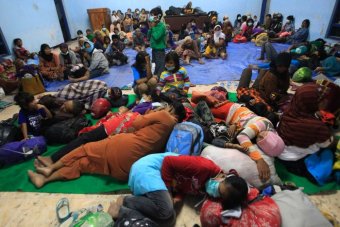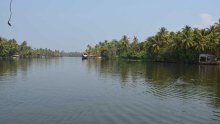Indonesia's Mt Kelud volcano erupts: Tens of thousands flee, airports closed
Updated
Tens of thousands of Indonesians have fled their homes and at least three people have died after a volcano on the island of Java erupted.
Mount Kelud erupted late on Thursday (local time), spewing out ash and sand 17 kilometres into the air and blanketing villages up to 500 kilometres away.
Hours earlier officials raised an alert urging people living in villages within 10km of the volcano to evacuate.
Authorities say around 200,000 people have been affected and there is widespread disruption to flights as several airports have been closed due to poor visibility.
"Based on verified data, over 76,000 people have been evacuated from five cities around the volcano ... and about 200,000 people were affected," national disaster mitigation agency spokesman Sutopo Purwo Nugroho said.
Mr Nugroho said two people were killed after their houses collapsed under the weight of the fallen ash.
There are still tremors coming from the volcano, but authorities say another major eruption is unlikely in the short term.
Airports closed, flights cancelled
Airports at Surabaya, Bandung, Yogyakarta, Solo, Malang, Semarang and the major oil refinery town of Cilacap have been closed.
Flights to South East Asia are mostly back to normal after some airlines were forced to cancel their services.
Virgin, Qantas and Jetstar cancelled flights to Bali, Jakarta Thailand and Singapore.
The flights were cancelled as a precaution after some airlines experienced smoke in their cabins while flying over the region.
Earlier, Virgin said passenger safety was its priority and it couldn't safely fly within 100 nautical miles of the ash cloud.
Andy Wirson, the general manager of Yogyakarta airport, says the ash is too thick for the airport to function.
"The current conditions are that volcanic ash is now covering the runway, apron and tarmac," he said.
"We have already measured the thickness of the volcanic ash, which is at 5cm on the runway and tarmac, and two and half centimetres at the apron."
The airports were expected to reopen on Saturday morning, a transport ministry official said.
One Australian woman says she and her partner were on their way to Singapore to go on a cruise.
"We were so excited, being Valentine's Day... everything was great, having a few drinks on the plane, and then all of a sudden Adam's looked out of the window and said 'We're doing a 360'," she said.
"We've got a cruise to go to tomorrow and so we're just hoping to get on the cruise. We've been looking forward to it for months and months.
"Jetstar staff were absolutely magnificent, they kept everyone very well informed. They came down, they were very apologetic.
"It's not their fault, and I'd rather land safely than not land at all."
 Photo:
Villagers evacuated from their homes, due to the eruption of Mount Kelud, sleep on the floor at a temporary shelter in the village of Sumber Agung. (Reuters: Sigit Pamungkas )
Photo:
Villagers evacuated from their homes, due to the eruption of Mount Kelud, sleep on the floor at a temporary shelter in the village of Sumber Agung. (Reuters: Sigit Pamungkas )
Locals evacuate hours before eruption
Mount Kelud, located in Kediri district, is considered one of the most dangerous volcanoes on the densely populated island.
People living within a 10-kilometre radius of Kelud were asked to evacuate late on Thursday, just hours before the volcano began erupting.
Earlier, national disaster agency spokesman Sutopo Nugroho said a rain of ash, sand and rocks was falling on an area stretching 15 kilometres from the volcano's crater.
"Sparks of light can be continuously seen at the peak," he said.
Mr Nugroho said the eruption had caused minimal damage to buildings, but has left three to five centimetres of ash and sand on the roads.
Meanwhile, local television has broadcasted images of plants, streets and houses blanketed in a thick layer of grey ash.
At the world's largest Buddhist temple outside Yogyakarta, nearly 135km away, workers rushed to cover statues with plastic sheets to protect them from the falling ash.
The 1,731m Mount Kelud has claimed more than 15,000 lives since 1500, including around 10,000 deaths in a massive 1568 eruption.
It is one of some 130 active volcanoes in Indonesia, which sits on the Pacific Ring of Fire, a belt of seismic activity running around the basin of the Pacific Ocean.
Earlier this month Mount Sinabung on western Sumatra island erupted, leaving at least 16 people dead.
Sinabung has been erupting on an almost daily basis since September, coating villages and crops with volcanic ash and forcing tens of thousands out of their homes.
AFP/ABC
Topics: volcanic-eruption, disasters-and-accidents, indonesia, asia
First posted



















